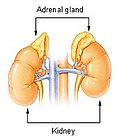Wikimedia Commons has media related to Neisseria meningitidis. Neisseria meningitidis, often referred to as the meningococcus, is a Gram-negative bacterium...
41 KB (4,640 words) - 09:51, 25 May 2024
species that colonize humans, only two are pathogens, N. meningitidis and N. gonorrhoeae. Neisseria species are Gram-negative bacteria included among the...
16 KB (1,670 words) - 01:23, 23 July 2024
pathogenic: N. gonorrhoeae and N. meningitidis, with N. gonorrhoeaa being the causative agent of gonorrhea and N. meningitidis being one of the causes of bacterial...
43 KB (4,712 words) - 15:01, 13 September 2024
Meningococcal disease describes infections caused by the bacterium Neisseria meningitidis (also termed meningococcus). It has a high mortality rate if untreated...
45 KB (4,915 words) - 16:51, 26 September 2024
microbial species. The first MLST scheme to be developed was for Neisseria meningitidis, the causative agent of meningococcal meningitis and septicaemia...
27 KB (3,452 words) - 02:22, 3 December 2023
Meningococcal vaccine refers to any vaccine used to prevent infection by Neisseria meningitidis. Different versions are effective against some or all of the following...
50 KB (4,301 words) - 21:56, 23 September 2024
Uptake signal sequence (section Neisseria meningitidis)
found in species of the family Neisseriaceae (including Neisseria meningitidis and Neisseria gonorrhoeae). Genetic transformation is the process by which...
4 KB (423 words) - 05:06, 28 November 2023
of age. Invasive meningococcal disease, caused by the bacterium Neisseria meningitidis, can lead to serious conditions such as meningitis (inflammation...
8 KB (587 words) - 06:59, 24 September 2024
is nonessential in at least some gram-negative bacteria, such as Neisseria meningitidis, Moraxella catarrhalis, and Acinetobacter baumannii. It has also...
63 KB (7,185 words) - 14:54, 18 September 2024
caused by severe bacterial infection. Typically, it is caused by Neisseria meningitidis. The bacterial infection leads to massive bleeding into one or (usually)...
12 KB (1,178 words) - 19:05, 8 September 2024






